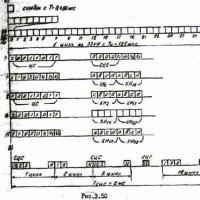3.1 Course of hostilities, June 1941 - November 1942
The attack on the Soviet Union took place without a declaration of war in the morning hours of June 22, 1941. Despite the long preparations for war, the attack turned out to be completely unexpected for the USSR, since the German leadership did not even have a pretext for an attack.
The military events of the first weeks inspired full hope for the success of the next "blitzkrieg". Armored formations advanced quickly and occupied vast expanses of the country. In major battles and in encirclement, the Soviet Army suffered millions of casualties in killed and captured. A large number of military equipment was destroyed or captured as trophies. Again, it seemed that the doubts and feelings of fear that had spread in Germany, despite careful ideological preparation, had been disproved by the successes of the Wehrmacht. The Church Board of Trustees of the German Evangelical Church expressed the feelings that gripped many, assuring Hitler by telegraph that "he is supported by all the evangelical Christianity of the Reich in the decisive battles with the mortal enemy of order and Western Christian culture."
The successes of the Wehrmacht evoked various reactions from the Soviet side. There were manifestations of panic and confusion, the soldiers left their military units. And even Stalin first addressed the population only on July 3. In areas captured or annexed by the Soviet Union in 1939/40. part of the population welcomed the Germans as liberators. Nevertheless, from the first day of the war, Soviet troops offered unexpectedly strong resistance even in the most hopeless situations. And the civilian population actively participated in the evacuation and movement of militarily important industrial facilities beyond the Urals.
Persistent Soviet resistance and the heavy losses of the German Wehrmacht (until December 1, 1941, about 200,000 killed and missing, almost 500,000 wounded) soon disproved the German hopes for an easy and quick victory. Autumn mud, snow and a terrible cold in winter interfered with the military operations of the Wehrmacht. The German army was not prepared for the war in winter conditions, it was believed that by this time victory would have been achieved. An attempt to capture Moscow as the political center of the Soviet Union failed, although German troops approached the city at a distance of 30 kilometers. In early December, the Soviet Army unexpectedly launched a counteroffensive, which was successful not only near Moscow, but also in other sectors of the front. Thus, the concept of blitzkrieg was finally wrecked.
In the summer of 1942, new forces were accumulated to advance in a southerly direction. Although the German troops managed to capture large territories and advance as far as the Caucasus, they could not fortify anywhere. The oil fields were in Soviet hands, and Stalingrad became a foothold on the western bank of the Volga. In November 1942, the line of German fronts in the territory of the Soviet Union reached its greatest extent, but there could be no question of a decisive success.
Chronicle of the war from June 1941 to November 1942
22.6.41. The beginning of the German attack, the advancement of three army groups. Romania, Italy, Slovakia, Finland and Hungary entered the war on the side of Germany.29/30.6.41 The Central Committee of the All-Union Communist Party of Bolsheviks (b) declares war a "patriotic" war of all the people; formation of the State Defense Committee.
July August. The German offensive along the entire front, the destruction of large Soviet formations in the environment (Bialystok and Minsk: 328,000 prisoners, Smolensk: 310,000 prisoners).
September. Leningrad is cut off from the rest of the country. East of Kyiv, over 600,000 Soviet soldiers were captured and surrounded. The general offensive of the German troops, which are suffering heavy losses, is slowed down due to the constant resistance of the Soviet Army.
2.10.41. The beginning of the offensive on Moscow, some sections of the front line at the end of November were 30 km from Moscow.
5.12.41. The beginning of the Soviet counter-offensive with fresh forces near Moscow, the German retreat. After the intervention of Hitler, the stabilization of the defensive positions of Army Group Center in January 1942 at the cost of heavy losses. Soviet success in the south.
12/11/41. Germany declares war on the USA.
In 1941, the Soviet Army lost 1.5 - 2.5 million soldiers killed and about 3 million prisoners. The number of civilian deaths is not precisely established, but it is estimated in the millions. Losses of the German army - about 200,000 people killed and missing.
January - March 1942 A wide winter offensive of the Soviet Army, partly successful, but not reaching its goals due to heavy losses. The losses of the German army in manpower and equipment were also so great that the continuation of the offensive on a broad front turned out to be impossible at the moment.
May. The failure of the Soviet offensive near Kharkov; during the counteroffensive, 250,000 Soviet soldiers were surrounded and taken prisoner.
June July. The capture of the fortress of Sevastopol and thus the entire Crimea. The beginning of the German summer offensive, with the aim of reaching the Volga and capturing oil fields in the Caucasus. The Soviet side, in view of the new victories of Germany, is in a state of crisis.
August. German troops reach the Caucasus Mountains, but fail to inflict a decisive defeat on the Soviet troops.
September. The beginning of the battles for Stalingrad, which in October was almost completely captured by the Germans. Nevertheless, the Soviet bridgehead on the western bank of the Volga under the command of General Chuikov could not be destroyed.
9.11.42. Beginning of the Soviet counter-offensive at Stalingrad.
50 The Soviet population listens in the street to the government message about the beginning of the war, 22.6.1941.
Text 33
From a speech on the radio by People's Commissar for Foreign Affairs Molotov on 22 June 1941
Citizens and citizens of the Soviet Union! The Soviet government and its head, Comrade Stalin, have instructed me to make the following statement: Today, at 4 o'clock in the morning, without declaring any claims against the Soviet Union, without declaring war, German troops attacked our country, attacked our borders in many places and bombed our cities - Zhitomir, Kiev, Sevastopol, Kaunas and some others, moreover, more than two hundred people were killed and wounded. Enemy aircraft raids and artillery shelling were also carried out from the Romanian and Finnish territories. This unheard-of attack on our country is treachery unparalleled in the history of civilized peoples. The attack on our country was carried out despite the fact that a non-aggression pact was concluded between the USSR and Germany, and the Soviet government fulfilled all the conditions of this pact in all good faith. The attack on our country was carried out despite the fact that during the entire period of the validity of this treaty the German government could never make a single claim against the USSR regarding the fulfillment of the treaty. All responsibility for this robbery attack on the Soviet Union will fall entirely on the German fascist rulers. [...]
This war was imposed on us not by the German people, not by the German workers, peasants and intelligentsia, whose sufferings we understand very well, but by a clique of bloodthirsty fascist rulers of Germany who enslaved the French, Czechs, Poles, Serbs, Norway, Belgium, Denmark, Holland, Greece and other peoples . [...]
This is not the first time our people have had to deal with an attacking, conceited enemy. At one time, our people responded to Napoleon's campaign in Russia with a Patriotic War, and Napoleon was defeated and came to his collapse. The same will happen to the arrogant Hitler, who has announced a new campaign against our country. The Red Army and all our people will once again wage a victorious patriotic war for the Motherland, for honor, for freedom.
Text 34
An excerpt from the diary of Elena Scriabina dated 22.6.1941 about the news of the German attack.
Molotov's speech sounded haltingly, hurriedly, as if he were out of breath. His encouragement sounded completely out of place. Immediately there was a feeling that a monster was approaching menacingly, slowly and terrified everyone. After the news, I ran out into the street. The city was in a panic. People hurriedly exchanged a few words, rushed to the shops and bought everything that came to hand. As if beside themselves, they rushed about the streets, many went to the savings banks to collect their savings. This wave swept over me too, and I tried to get rubles from my passbook. But I came too late, the cashier was empty, the payment was suspended, everyone around was noisy, complaining. And the June day was blazing, the heat was unbearable, someone felt ill, someone cursed in despair. All day the mood was restless and tense. Only in the evening it became strangely quiet. It seemed that everyone was somewhere huddled with horror. Text 35
Excerpts from the diary of NKVD major Shabalin from 6 to 19 October 1941
Major Shabalin died on 20.10. when trying to get out of the environment. The diary was transferred to the German army for military analysis. Back translation from German; the original is lost.
Diary
Major NKVD Shabalin,
head of the special department of the NKVD
at 50 army
for the accuracy of transmission
Chief of Staff of the 2nd Tank Army
Signed Frh.f. Liebenstein
[...]
The army is not what we used to think and imagine at home. Huge lack of everything. The attacks of our armies are disappointing.
We are interrogating a red-haired German prisoner, a shabby guy, covered in shrouds, extremely stupid. [...]
The situation with the personnel is very difficult, almost the entire army consists of people whose native places have been captured by the Germans. They want to go home. Inactivity at the front, sitting in the trenches demoralize the Red Army. There are cases of drunkenness of command and political personnel. People sometimes do not return from reconnaissance. [...]
The enemy has encircled us. Continuous cannonade. Duel of artillerymen, mortarmen and submachine gunners. Danger and fear almost the whole day. I'm not talking anymore about the forest, the swamp and the lodging for the night. Since the 12th I have not slept any more, since October 8th I have not read a single newspaper.
Creepy! I wander, around the corpses, the horrors of war, continuous shelling! Again hungry and without sleep. He took a bottle of alcohol. Went to the forest to explore. Our complete annihilation is evident. The army is defeated, the convoy is destroyed. I am writing in the woods by the fire. In the morning I lost all the Chekists, I was left alone among strangers. The army collapsed.
I spent the night in the forest. I haven't eaten bread for three days. There are a lot of Red Army soldiers in the forest; there are no commanders. Throughout the night and in the morning the Germans shelled the forest with weapons of all kinds. At about 7 o'clock in the morning we got up and went north. Shooting continues. At the halt, I washed up. [...]
All night we walked in the rain through the swampy terrain. Endless darkness. I was soaked to the skin, my right leg was swollen; terribly hard to walk.
Text 36
Field mail letter from non-commissioned officer Robert Rupp to his wife dated July 1, 1941 about the attitude towards Soviet prisoners of war.
They say that the Fuhrer's order was issued that prisoners and those who surrender are no longer subject to execution. It makes me happy. Finally! Many of the executed, whom I saw on the ground, were lying with their hands raised up, without weapons and even without a belt. I have seen at least a hundred of them. They say that even a truce envoy walking with a white flag was shot dead! After dinner, they said that the Russians were surrendering in whole companies. The method was bad. Even the wounded were shot. Text 37
Diary entry of the former ambassador Ulrich von Hassell dated 18.8.1941 regarding the war crimes of the Wehrmacht.
Ulrich von Hassell took an active part in the anti-Hitler Resistance of conservative circles and was executed after the assassination attempt on Hitler on July 20, 1944.
18. 8. 41 [...]
The whole war in the east is terrible, the general savagery. One young officer received an order to destroy 350 civilians driven into a large barn, among whom were women and children, at first refused to do this, but he was told that this was a failure to comply with the order, after which he asked for 10 minutes to think and finally did it , sending, together with some others, machine-gun bursts into the open door of the shed into a crowd of people, and then, finishing off the still alive from machine guns. He was so shocked by this that later, having received a slight wound, he firmly decided not to return to the front.
Text 38
Excerpts from the order of the commander of the 17th Army, Colonel-General Hoth, dated 11/17/1941, regarding the basic principles of warfare.
Command 17th Army A.Gef.St.,
1a No. 0973/41 secret. dated 17.11.41
[...]
2. The campaign to the East must end differently than, for example, the war against the French. This summer it becomes more and more clear to us that here, in the East, two internally irresistible views are fighting against each other: the German sense of honor and race, the centuries-old German army against the Asiatic type of thinking and primitive instincts, fueled by a small number of mostly Jewish intellectuals: fear of whip, disregard for moral values, equalization of the lower, neglect of one's life of no value.
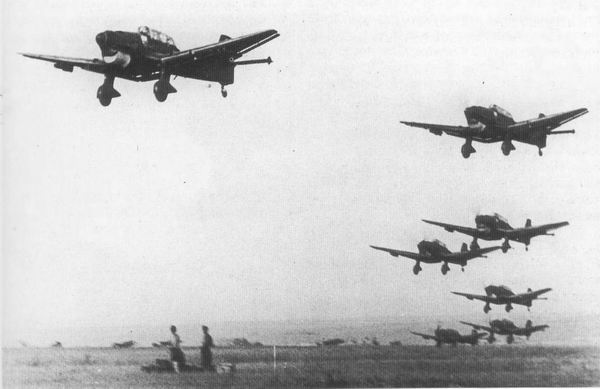
51 German Junkere Ju-87 (Shtukas) dive bombers take off from a field airfield in the Soviet Union, 1941.
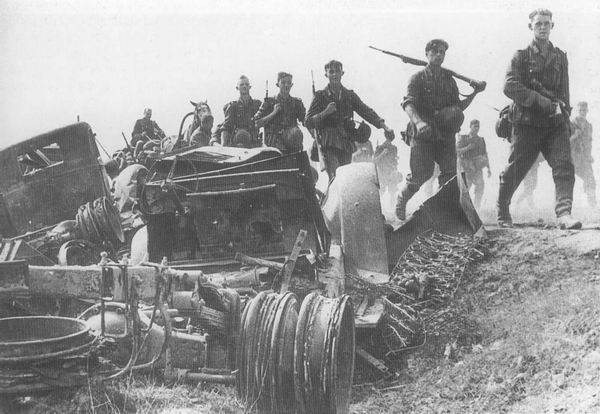
52 German infantry on the march, 1941
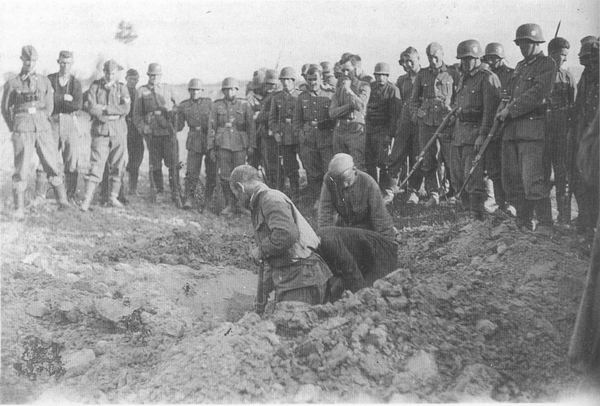
53 Soviet prisoners dig their own grave, 1941.
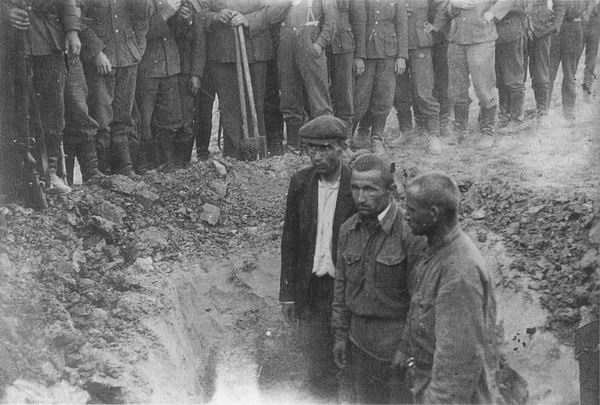
54 Soviet prisoners before execution, 1941. Both photographs (53 and 54) were in the wallet of a German soldier who died near Moscow. The place and circumstances of the execution are unknown.
More strongly than ever, we believe in a historical turning point, when the German people, by virtue of the superiority of their race and their successes, will assume control of Europe. We are more clearly aware of our calling to save European culture from Asiatic barbarism. Now we know that we have to fight an embittered and stubborn enemy. This struggle can only end in the annihilation of one side or the other; there can be no agreement. [...]
6. I demand that every soldier of the army should be imbued with pride in our successes, with a sense of unconditional superiority. We are the masters of this country which we have conquered. Our feeling of dominance is expressed not in satiety, not in contemptuous behavior, and not even in selfish abuse of power by individuals, but in a conscious opposition to Bolshevism, in strict discipline, inflexible determination and tireless vigilance.
8. There should be absolutely no place for sympathy and gentleness towards the population. The Red soldiers brutally killed our wounded; they dealt cruelly with the prisoners and killed them. We must remember this if the population, which once endured the Bolshevik yoke, now wants to receive us with joy and worship. The Volksdeutsche should be treated with a sense of self-awareness and with calm restraint. The fight against impending food difficulties should be left to the self-government of the enemy population. Any trace of active or passive resistance, or any machinations of Bolshevik-Jewish instigators, must be eradicated immediately. The need for harsh measures against elements hostile to the people and our policy must be understood by the soldiers. [...]
Behind everyday life, we should not lose sight of the worldwide significance of our struggle against Soviet Russia. The Russian masses have been paralyzing Europe for two centuries now. The need to take Russia into account and the fear of her possible attack constantly dominated political relations in Europe and hampered peaceful development. Russia is not a European, but an Asian state. Each step into the depths of this dull, enslaved country allows you to see this difference. From this pressure and from the destructive forces of Bolshevism, Europe and especially Germany must be liberated forever.
For this we fight and work.
Commander Hoth (signed)
Send to the following units: regiments and separate battalions, including construction and service units, to the commander of the patrol service; distributor 1a; reserve = 10 copies.
Text 39
Report of the commander of the rear of the 2nd Panzer Army, General von Schenckendorff dated 24. 3. 1942 regarding looting.
Commander of the 2nd Panzer Army 24.3.42 Rel.: unauthorized requisition;
Appendix
1) The commander of the rear of the 2nd Panzer Army in a daily report dated 23.2.42: “Unauthorized requisition by German soldiers near Navlya is increasing. From Gremyachey (28 km southwest of Karachev), soldiers from the area of Karachevo took away 76 cows without a certificate, from Plastovoye (32 km southwest of Karachev) - 69 cows. Not a single head of cattle remained in either place. In addition, the Russian law enforcement service was disarmed in Plastovoi; the next day the settlement was occupied by partisans. In the area of Synezerko (25 km south of Bryansk), the soldiers of the platoon commander Sebastian (code 2) wildly requisitioned cattle, and in a neighboring village they shot at the village headman and his assistants. [...]
Increasingly, these cases are being reported. In this regard, I especially point out the issued orders on the conduct of troops and their supply in the country in accordance with the order. They are once again reflected in the application.

